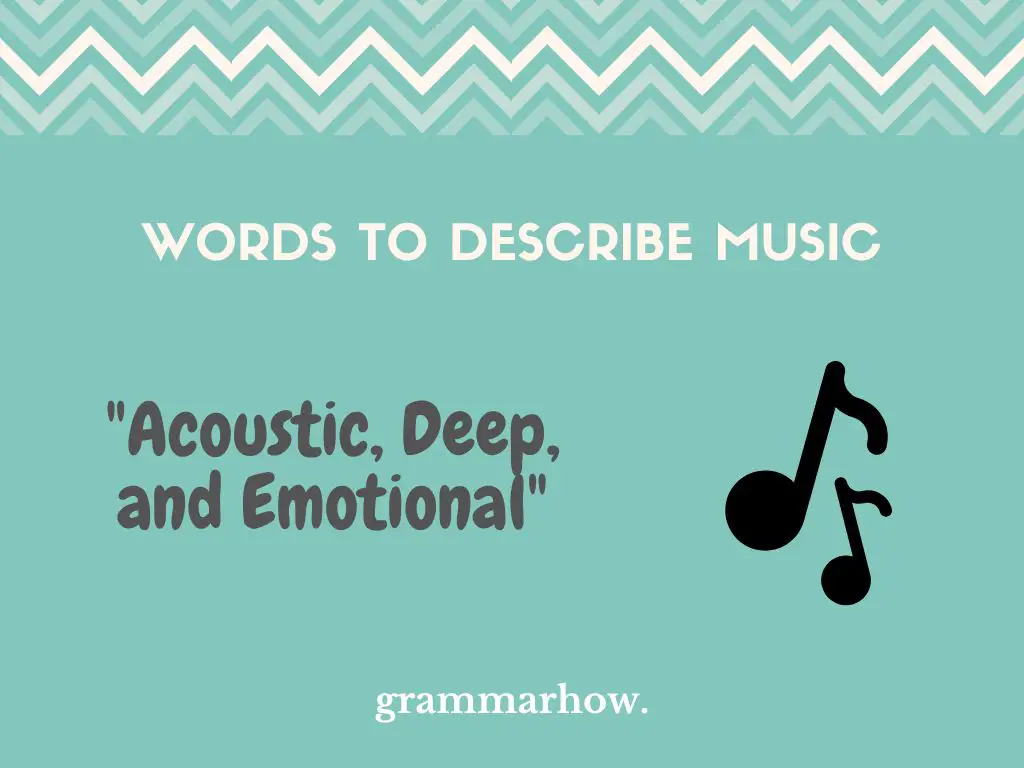Английская лексика на тему музыки
1. Questions about music
Do you like music? — Вы любите музыку?
Can you play any instrument? — Ты умеешь играть на какому-нибудь инструментах?
Do you like singing? — Ты любишь петь?
What is your favourite type of music? — Какая ваша любимая музыка?
What genre of music do you listen to? — Какой жанр музыки ты слушаешь?
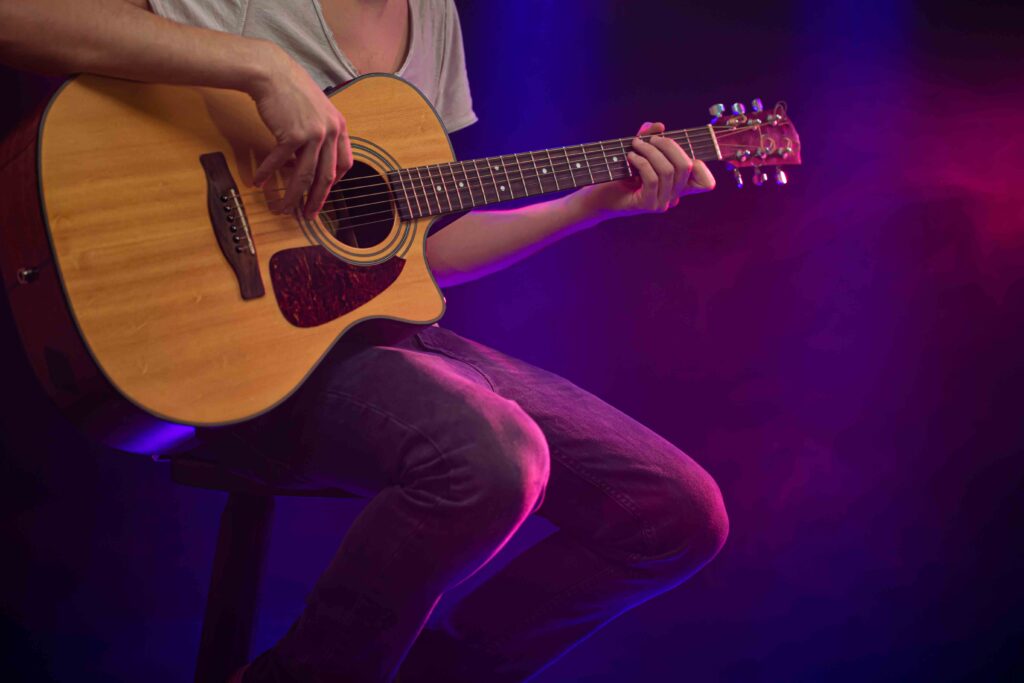
2. Actions
to sing along
to sing karaoke
an earworm — навязчивая мелодия
It’s just an earworm. — Это просто навязчивая мелодия.
to get stuck in your head
to have taste in music — иметь вкус к музыке
to be tone deaf — медведь на ухо наступил (быть глухим)
set my favourite song as a ringtone — установить мою любимую песню в качестве мелодии звонка
to own a lot of vinyl — иметь много виниловых пластинок
to own a lot of records — иметь много записей
to own a lot of physical albums — иметь много альбомов (физических альбомов)
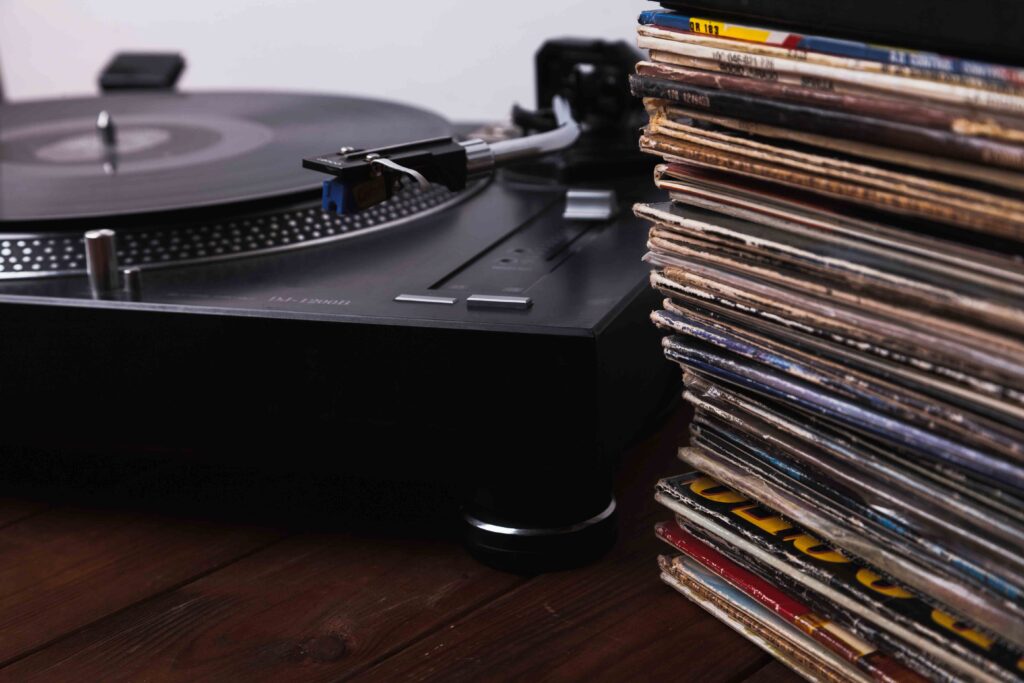
3. Words to describe the type of music
fast tempo — быстрый темп
The song is so upbeat.
a complex song — сложная песня
heavy music — тяжелая музыка
loud music — громкая музыка
relaxing music — расслабляющая музыка
soft music — мягкая музыка
piercing music — пронзительная музыка
hurt your ears — навредить твоим ушам
rhythmic music — ритмичная музыка
uplifting music — воодушевляющая музыка
melancholic music — меланхолическая музыка
catchy music — запоминающаяся музыка
lively music — живая музыка
harmonic music — гармоническая музыка
make you fell better (happier) — делать тебя счастливее, чувствовать себя лучше
It has a pleasing melody. — У него приятная мелодия.
That sounds awful. — Это звучит ужасно.
It makes my ears hurt. — У меня болят уши.
That’s too much of noise than music. — Это шум, а не музыка.
It heals. — Она исцеляет.
It stirs up my imagination. — Она будоражит мое воображение.
It’s rejuvenating. — Она делает моложе.


4. Концерты
a concert — концерт
a gig — концерт
live show — прямой эфир

5. Люди
a musician — музыкант
a band — музыкальная группа
women performers — женщины-исполнители
a vocalist — вокалист
a singer — певец
an artist — исполнитель
a music lover — любитель музыки
a music buff — любитель музыки
a music expert — музыкальный эксперт
to pick certain tunes — выбирать определенную мелодию
to develop a deeper understanding of music — развить более глубокое понимание музыки
to explore different genres of music — исследовать разные жанры музыки
an album — альбом
a record — запись
vinyl — виниловая пластинка
a vinyl lover — любитель виниловых пластинок
CD
physical music
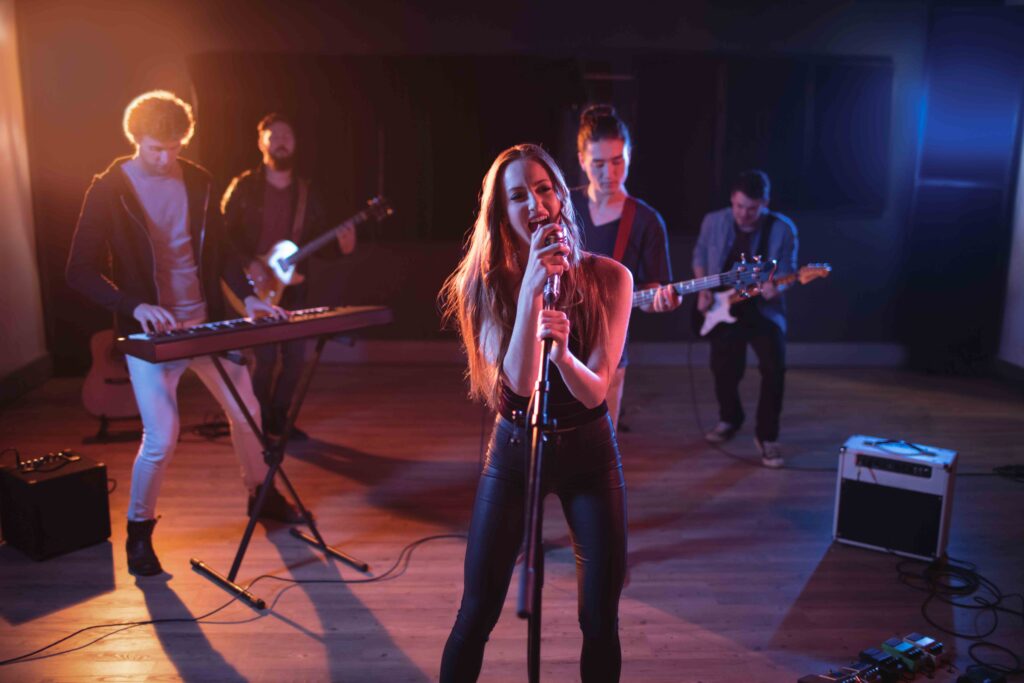
6. Составляющие музыки
a tune — мелодия
to play a tune — сыграть мелодию
rhythm — ритм
a good track (song) — хороший трек (песня)
catchy beat — запоминающийся ритм
to like a beat of that song — любить ритм этой песни
fast tempo — быстрый темп
slow tempo — медленный темп
the sense of rhythm — чувство ритма
a downtempo song — тихая (спокойная) песня
7. Успех
a record label — звукозаписывающая компания, студия звукозаписи
a small record label — небольшая студия звукозаписи
to have a massive hit — иметь огромный успех
to have a huge (giant) following/fan base — иметь огромную (гигантскую) базу подписчиков / фанатов
to getting signed by a record label — подписать контракт с лейблом
Many girls are head over heels in love with him. — Многие девушки по уши влюблены в него.
head over heels — по уши
8. Top 10 genres of Music Industry
8.1. Electronic Dance Music — Электронная танцевальная музыка
be produced by DJs
add dozens of tones to a piece to create unique music
hear them in clubs
was known in the form of Jamaican dub music
8.2. Rock Music
has been rocking the world since the 1950s
started actually around string instruments
Its loud and strong beats make it popular among the youths.
Rock bands:
Metallica, Pink Floyd, Nirvana, The Doors
8.3. Jazz
has its roots both in the West African and European culture
Originating in the late 19th to early 20th century.
Women performers:
Ella Fitzgerald, Betty Carter, Abbey Lincoln and Ethel Waters
8.4. Dubstep — Дабстеп
falling in the electronic music genre
8.5. Rhythm and Blues — Ритм-энд-блюз
Vocalists:
Rihanna, Mariah Carey, Beyoncé, Usher and the legendary Michael Jackson
be a combination of hip hop, funk, dance, pop and soul focusing on themes like relationships and freedom
8.6. Techno — Техно
the use of technology today has greatly enhanced the quality of techno style music and popularizing it among people day by day
8.7. Country Music — Кантри-музыка
to be a popular genre of American music which originated in the 1920s
having its roots from American folk and western music
using simple forms of instruments ranging from electric and steel guitars to drums and mandolin or mouth organ
Music singers:
Kenny Rogers, Shania Twain, Johnny Cash Taylor Swift
8.8. Electro — Электро
It is a blend of hip hop and electronic music. — Смесь хип-хопа и электронной музыки.
using a drum machine, vocoder and talkbox
Notable artists who have been into this form of music:
Arthur Baker, Freeez, Man Parrish and Midnight Star
8.9. Indie Rock — Инди-рок
It was originated in the 1980s and has gradually changed the music industry.
8.10. Pop Music — Поп-музыка
This form can include any form of music ranging from urban and dance to rock, country and Latin.
Instruments highly used are electric guitars, synthesizer drums as well as bass.
8.11. Classical Music
J.S. Bach — St Matthew Passion
Tchaikovsky — Symphony No. 6
Beethoven — Grosse Fuge
Mozart — Requiem
8.12. K-pop
Kpop is Korean popular music.
9. Types of musical instruments
9.1. Percussion instruments — Ударные инструменты
the piano, the xylophone, the cymbals
9.2. Wind instruments — Духовые инструменты
the saxophone, the flute, the trumpet, the clarinet
9.3. Stringed instruments — Струнные инструменты
the guitar, the violin, the cello
9.4. Electronic instruments — Электронные инструменты
the Xth Sense
9.5. Membranophones — Мембранофоны
Cylindrical drums, barrel drums, hourglass drums
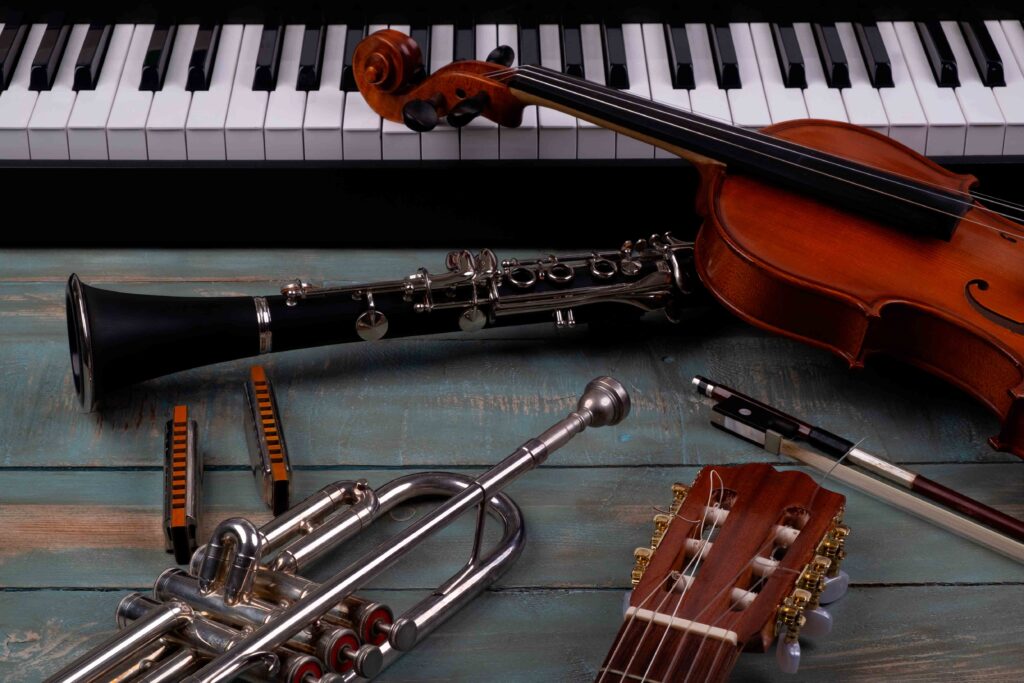
10. Apps for listening to music
Amazon Music (free/subscription)
Spotify (free/subscription)
Apple Music (subscription)
YouTube Music (free/subscription)
Bandcamp (individual purchases)
Shazam (free)
11. Benefits of Learning a Musical Instrument
11.1. Creativity
produce your music out of artistry
11.2. Memory Skills
can help exercise your brain
11.3. Boosts Your Confidence
need to perform in front of your fellow students, teachers, or family and friends
11.4. Coordination Skills
stimulating your brain and body to communicate with your mind, hands, and eyes
11.5. Maths
enhancing the sense of rhythm, beat, and scale. These are critical factors that stimulate your problem-solving skills.
11.6. Improved Academic Achievements

Репетитор английского языка
This list of music vocabulary, with example sentences, includes many of the words you’ll come across when reading or talking about music. Most of the words are related to popular music, but many can also be used when talking about other types of music like classical or traditional folk music. The list includes all the words defined in the EnglishClub music vocabulary section. The section covers popular music genres and has pages on the history of pop music, rock music, country music, soul music, dance music and hip hop.
acoustic (adjective): without inbuilt electrical equipment to amplify the sound — I can play acoustic guitar, but I can’t play electric guitar.
album (noun): a collection of songs released as a digital download or a 12-inch LP record — Do you have Michael Jackson’s album Thriller?
alternative hip hop (noun): any style that isn’t mainstream commercial hip hop — Have you heard much alternative hip hop?
alternative rock (noun): non-mainstream rock music inspired by punk and post-punk — My sister likes pop music, but I like alternative rock.
ambient music (noun): calming, atmospheric background music — Have you heard Brian Eno’s ambient music?
amplify (verb): to make sounds louder, esp. by using electrical equipment — If we don’t amplify the drums, they’ll be hard to hear.
artist (noun): a professional singer, musician or songwriter — Taylor Swift has become one of music’s best-selling artists.
art music (noun): music written and performed by professional musicians mostly for the upper classes, like classical Indian music and European opera — Wealthy Chinese lords paid musicians to play relaxing art music, while poor people played lively folk music for fun.
audio editing software (noun): software used to produce music, movie soundtracks, etc. — Before we had audio editing software, we used tape loops.
authentic (adjective): real or genuine — You can still see an authentic Chinese opera in Beijing.
autoharp (noun): a small harp with buttons to press for playing chords — Is the autoharp used much in bluegrass music?
avant-garde (adjective): new, unusual and experimental — Harry makes avant-garde electronic music in his spare time.
backbeat (noun): a beat counted as «two» or «four» in 4/4 rhythm — Can you hear the snare drum playing on the backbeats?
backing singer (also «backing vocalist») (noun): a singer who gives vocal support to a lead singer — Tessa was one of Joe Cocker’s backing singers.
ballad (noun): a slow song usually about love — Janis sings up-tempo rock songs as well as slow ballads.
banjo (noun): an African American stringed instrument based on the African kora — Do you play four-string or five-string banjo?
bar (noun): one of many small sections in a piece of music that contains a fixed number of beats — Each bar in the song has four beats.
bass (guitar) (noun): an electric guitar with thick strings for playing low «bass» notes — We need someone who can play bass.
beat (noun): the regular pulse in music that dancers move to and audiences clap to — Dance music always has a strong beat.
beats (noun): the breakbeat rhythms that MCs rap to in hip hop music — Who produced the beats on this album?
bebop (noun): a complex style of up-tempo jazz from the 1950s — The best bebop player I ever heard was Charlie Parker.
big band (noun): a large jazz band, esp. one that plays big band jazz — Most popular singers of the 30s and 40s had their own big bands.
big beat (noun): an EDM genre with breakbeats, heavy bass, vocals and samples — Maxim loves that big beat sound.
block party (noun): a free party on the streets of a city block — Are you going to the block party on Saturday?
bluegrass (noun): a style of country music based on old-time Appalachian music — We’re going to a bluegrass concert tonight.
(the) blues (noun): African American guitar-based folk music that led to R&B and rock — I’m learning some old blues songs.
bpm (noun): beats per minute — The fastest drum and bass tracks are around 160 bpm.
boy band (noun): a group of three or more boys or young men who sing and dance — My little sister loves that Korean boy band Super Junior.
brass (noun): instruments made of brass, like the trumpet, trombone and tuba — Harry plays trumpet in a brass band.
break (noun): a moment in which most instruments stop, but one or two continue, esp. drums — We sampled a snare-drum break from an old jazz record.
breakbeat (noun): a syncopated jazz or funk rhythm of the sort sampled in hip hop music — Hip hop and dubstep use breakbeats, not disco beats.
breakdancing (noun): a style of street-dancing in hip hop culture — The breakdancing in this Turf Feinz video is incredible.
breakdown (noun): section of a dance track with less singing and more percussion — Does the track have a good breakdown?
call and response (noun): two musical phrases, one of which answers the other — The call and response is before the last chorus.
catchy (adjective): enjoyable when first heard, and difficult to forget — It’s so catchy! I can’t stop hearing it in my head.
(the) charts (noun): lists of the best-selling songs of the previous week — Our single got to the top of the charts!
chord (noun): three or more notes played together — Lots of great songs only have two chords, you know.
chorus (noun): the part of a song with the same melody and words each time it’s heard — I’ll sing the verses, and you sing the choruses.
classic (adjective): very good and highly-regarded for a long time — Neil loves those classic American cars of the 50s.
classical music (noun): European orchestral and keyboard music that’s written by composers — Sayoko loves classical music, especially Chopin’s piano pieces.
collaborate (verb): to work together with someone to produce something — Has Kanye collaborated with Drake yet?
commercial (adjective): made in order to be popular and make money — Garth’s country music is much too commercial for me.
contemporary R&B (noun): recent R&B that mixes soul, pop and hip hop sounds — Contemporary R&B is really popular these days.
crossover hit (noun): a country, dance or hip hop song that’s on the pop-music charts — We’ll all be rich if we have a crossover hit.
country music (noun): a genre of American music with origins in the rural folk music of Europe — Harry only listens to country music.
country pop (noun): a style that mixes pop and country music — Country pop is really popular in America these days.
country rock (noun): a style that mixes rock and country music — He doesn’t like country pop much, but he loves country rock.
dance-pop (noun): up-tempo pop music with a dance rhythm — Her dance-pop singles always become hits.
deejay (verb): to perform the skills of a club or hip hop DJ — Who’s deejaying for Nas these days?
disco (also «discotheque») (noun): a 70s nightclub in which DJs played dance records — The gay discos in New York were fabulous.
disco music (also «disco») (noun): 70s dance music with a steady four-on-the-floor beat — My sister loves dancing to disco music.
DJ (or «disc jockey») (noun): someone who plays records at dance clubs or on radio — Do you like the tracks this DJ’s playing?
DJ mixer (noun): a small mixer made for DJs — All you need is two turntables, a DJ mixer and some records.
double bass (noun): a large stringed instrument for playing low notes — In jazz, double bass strings are plucked instead of bowed.
drop (noun): a point in EDM when the rhythm and sounds suddenly change — If it’s a really great drop, everyone goes crazy.
drum and bass (or «DnB») (noun): an EDM genre with breakbeats, heavy bass and a fast tempo — Let’s make a drum and bass track.
drum kit (noun): a set of drums with a bass drum, snare drum, tom-toms, hit-hat and cymbals — How much did your drum kit cost?
drum machine (noun): an electronic instrument that makes sequenced drum sounds — Our drummer quit, so we’re using a drum machine now.
dubstep (noun): an EDM genre with breakbeat rhythms, very heavy bass and a slow tempo — My parents don’t even know what dubstep is!
duo (noun): two people who make music or perform together — Who’s on your list of best hip hop duos?
dynamic (adjective): lively and having a lot of energy — She’s one of the most dynamic singers I’ve seen perform.
EDM (noun): electronic dance music — That band didn’t start out playing EDM, did they?
explicit (adjective): offensive, obscene or «rude» language — Has the album got an explicit language warning?
fan (noun): someone who likes a particular artist or band very much — Our teacher’s a really big fan of Eminem.
feedback (noun): a high-pitched noise made when a microphone is close to a loudspeaker — How do you control feedback so it fits the music?
fiddle (noun): another word for «violin», esp. in country and folk music — Who’s playing fiddle on that record?
flow (noun): the ability to rap rhythmically and stylishly — He’s been practising, so his flow’s getting better.
folk music (noun): traditional music from a particular region or country — Did you hear any folk music while you were in Chile?
folk rock (noun): a style that mixes folk and rock music — We heard lots of folk rock bands in San Francisco in the early 60s.
formula (noun): a method or plan that’s believed to succeed — What’s your formula for success in business?
four-on-the-floor (noun): a 4/4 rhythm with bass drum on the beat and hi-hat on the offbeats — Terry’s sick of playing those four-on-the-floor disco beats.
funk (or «funk music») (noun): rhythmic groove-based music that developed from soul in the 60s — Bootsy Collins was the best funk bass player ever.
funky (adjective): having the feel of funk music, esp. rhythmically — That track Superstition by Stevie Wonder is incredibly funky.
gangsta rap (noun): hardcore-style rap from Los Angeles — My cousin still buys gangsta rap records!
genre (noun): a kind or style of music, movie, TV show, painting, etc. — In music classes at school, the only genres we studied were classical music and jazz.
G-Funk (noun): funk-based subgenre of gangsta rap — What’s your favourite G-Funk track?
glam rock (noun): a rock style in which male artists wore make-up and glamorous clothes — David Bowie had many styles besides glam rock.
gospel music (noun): rhythmic church music of African American Christians — They sang great gospel music in those old churches.
graffiti art (noun): street art that’s drawn, painted or sprayed in public places — What do you think of Banksy’s graffiti art?
groove (noun): a highly-rhythmic pattern repeated for a long time, esp. in funk music — Hip hop artists still sample James Brown’s funk grooves.
grunge (noun): punk-based alternative rock that developed in the USA in the 90s — Wasn’t Nirvana the first grunge band?
hardcore rap (noun): a tough style of New York hip hop music — Hardcore rap’s like those old gangster movies.
harmony (noun): the combining of musical notes that sound good when played or sung together — If we don’t sing in harmony, it’ll sound terrible.
heavy metal (noun): hard rock with heavy bass, complex drumming and singers who scream — My dad used to be in a heavy metal band.
hi-hat (noun): a pair of foot-operated cymbals that’s part of a drum kit — Drummers play bass drum with one foot and hi-hat with the other.
hillbilly (noun): an impolite word meaning a poor mountain farmer in the U.S.A. — In Nashville, old-time music was called hillbilly music.
hip hop (also «hip hop») (noun): a musical genre in which artists rap over beats and sampled sounds — I love Kanye West’s hip hop albums.
hit (noun): a best-selling song on the pop-music charts — It’s a great song. It’ll be a hit for sure.
honky tonk (noun): a country music style known for its powerful, emotional songs — Who’s your favourite honky tonk singer?
hook (noun): part of a song that’s easily remembered, often a chorus — The Knack’s My Sharona has one of greatest hooks ever!
horn section (noun): a group of musicians playing brass instruments and saxophones — How many songs does the horn section play on?
house (or «house music») (noun): 80s dance music similar to disco but with more electronic sounds — Those old house tracks still sound great.
house band (noun): a group of session musicians who work for a music company — House bands don’t become famous, but singers do.
house producer (noun): one of a record company’s full-time music producers — How many house producers does Sony Music have?
hymn (noun): a religious song that’s sung in church — My grandma loves singing those old hymns.
improvise (verb): to invent music spontaneously while playing — If you want to be a jazz musician, you have to learn how to improvise.
instrumental (adjective): played on instruments, without vocals — There’s a long instrumental section in the middle of the song.
jazz (noun): a genre in which artists improvise within a rhythmic and harmonic framework — We’ve got all John Coltrane’s jazz records.
jazz rap (noun): rap music made with jazz samples or instruments — Molly doesn’t like jazz rap much.
Latin music (noun): a genre of popular music in Latin America and Spain that has complex rhythms — Latin music makes me want to dance.
lead guitar (noun): a guitar on which melodic lines and solos are played — Who’s playing lead guitar in your new band?
live (adjective): played at a concert in front of an audience — You don’t hear live music in dance clubs anymore, only recorded music.
lyrics (noun): the words of a song — If you don’t listen to the lyrics, you won’t know what a song is about.
mainstream (adjective): normal and preferred by most people — Most people like mainstream hip hop more than alternative hip hop.
mandolin (noun): a stringed instrument like a guitar with a curved back — You can hear mandolin on those early old-time recordings.
MC (or «Master of Ceremonies») (noun): a DJ’s onstage announcer, esp. one who raps — Does your MC ever forget his raps?
melody (noun): a tune, or the notes of a song — Can you whistle the song’s melody?
mixtape (noun): a collection of free tracks, usually downloadable or on cassette tape — Let’s download some more mixtapes.
modal jazz (noun): jazz that uses Arabic or Indian modes instead of European scales — McCoy Tyner played modal jazz with John Coltrane.
neo soul (noun): a style that mixes contemporary R&B and 60s or 70s soul — Angelina played some great neo soul tracks at our party.
offbeat (noun): a beat between the main beats, often counted as «and» by musicians — Disco has hi-hats playing on all the offbeats.
old-time music (also «hillbilly music») (noun): country music originating in the Appalachian mountains of the USA — Do people still play old-time music much?
outlaw country (noun): a style of country music popular in the 1960s — Johnny Cash was one of those outlaw country singers.
pedal steel guitar (noun): an electric steel guitar on a stand with foot pedals for changing the sound — He’s teaching us pedal steel guitar.
pop music (noun): a popular music genre with catchy songs that are easy to remember — I love listening to pop music.
pop song (noun): any song that follows the pop music formula — Paul’s favourite pop song is God Only Knows by The Beach Boys.
pop soul (noun): a style of soul music with a pop-music sound — Mum’s listening to pop soul again.
popular music (noun): music that many people like and buy, like rock music and heavy metal, hip hop and rap, pop songs, etc. — Our music teacher knows lots about classical music, but nothing about popular music.
post-punk (adjective): of a style of experimental rock that developed after punk — Have you heard of a post-punk band called Joy Division?
pounding (adjective): having a very strong, loud and steady beat — Those pounding disco tracks are still great to dance to.
power chord (noun): a basic chord that can add power to music — The Kinks used lots of power chords in their song You Really Got Me.
producer (noun): someone who oversees the recording of music — Who was the producer on Nirvana’s first album?
progressive EDM (noun): EDM made for listening to as well as dancing to — I listen to progressive EDM when I’m on the bus.
protest song (noun): a song with lyrics that protest against war, injustice, etc. — Why don’t people write protest songs anymore?
psychedelic (adjective): related to powerful drugs like LSD — Lots of bands used psychedelic designs on their album covers in the 60s.
punk (rock) (noun): 70s and 80s rock music with short, fast, noisy songs — The first punk band I saw was The Sex Pistols.
rap (1) (noun): a set of lyrics rapped to a hip hop beat — He’s never done a rap about getting a job, has he?
rap (2) (verb): to speak rhythmically in rhymes over a hip hop beat — You want me to rap? I’ve never rapped in my life!
rapper (noun): an artist who performs raps over a hip hop beat — My daughter wants to be a rapper when she grows up.
rave (noun): a large dance party held outdoors or in an empty building — Did you go to any of those raves in the 90s?
record (noun): a thin disc of black plastic on which recorded music is imprinted and sold — I bought lots of punk records in the 70s.
recording (noun): a piece of music that’s recorded in a studio or at a concert — It’s one of the best recordings they’ve made.
recording session (noun): time spent recording in a music studio — We’ve got a recording session on Monday morning.
reggae music (noun): a genre of music that developed in Jamaica in the 1960s — If you want to hear reggae music, try Bob Marley and the Wailers.
remix (verb): to change a track’s sound-level mix and add effects — When he remixed our song, he made the bass drum much louder.
reverb (noun): an electronic sound effect similar to an echo — They used lots of reverb on those early Beach Boys songs.
revival (noun): the return to popularity of an old style or form — There was a rockabilly revival during the punk music years.
rhyme (noun): a word that ends with the same sound as another word — If you don’t use rhymes, you can’t call it rapping.
rhythm (noun): a pattern of beats and sounds that musicians play in time to and dancers move to — The rhythms of African music are really complex.
riff (noun): a repeated series of chords or notes, esp. on electric guitar — Justin wants to learn some heavy metal riffs.
rockabilly (noun): a style that mixes Western swing and R&B — Sam recorded lots of rockabilly songs at Sun Studio in Memphis.
rock music (noun): rhythmic blues-based music played on guitar, bass, drums, etc. — Let’s listen to some rock music for a change.
sample (verb): to copy a sound or section of music from a record or audio file — We sampled a snare-drum break from an old soul record.
sample-heavy (adjective): having many sampled sounds — If you like sample-heavy hip hop, you’ll love this album.
scale (noun): a series of notes in a fixed order from lowest to highest — The major and minor scales each have seven notes.
scratching (noun): moving a record quickly on a turntable to create a rhythmic scratching sound — There’s a lot of scratching in his beats.
secular (adjective): not religious, or with no connection to religion — Sam Cooke recorded secular versions of old gospel songs.
session musician (noun): a musician who can be hired to play on a recording — Session musicians don’t get much work these days.
set (noun): a group of songs performed one after the other — How many songs were in the band’s first set?
singer-songwriter (noun): a musician who writes and performs his or her own songs — Most singer-songwriters also play guitar or keyboards.
single (noun): a song released as a digital download, or as one of two songs on a 7-inch record — Have you heard their latest single?
standard (noun): a song that is often recorded and performed — Lots of Roy Orbison’s songs have become pop standards.
stand-up bass (or «string bass») (noun): another word for «double bass», esp. in country music — Rockabilly bands had stand-up bass instead of bass guitar.
soul (or «soul music») (noun): a genre that combines elements of gospel music, R&B and pop — My favourite soul singer is Al Green.
soundtrack album (noun): an album containing music made for a film — Has the soundtrack album been released yet?
strings (noun): an orchestral string section with violins, violas, cellos and double bass — Only the biggest jazz orchestras had strings.
swing (noun): up-tempo jazz for dancing played by big bands or jazz orchestras — Benny Goodman wrote lots of swing tunes.
synthesizer (noun): an instrument that makes and combines electronic sounds — Matt played organ and synthesizer in Use No Hooks.
tambourine (noun): an instrument with metal discs that rattles when hit or shaken — Mick Jagger often plays tambourine when he sings.
techno (noun): an EDM genre from Detroit that led to many subgenres — Which style of techno do you like the most?
texture (noun): the musical pattern created when sounds are combined — The textures on this track are amazing.
the South (noun): the southeastern part of the USA — Some of the best soul and hip hop artists are from the South.
tour (verb): to perform concerts in a series of cities or countries — The Rolling Stones are touring Europe later this year.
track (noun): a recording of a song or piece of music — Their new album has some really great tracks.
traditional music (noun): music that developed over a very long time, like traditional African drumming and Chinese folk songs — People still play traditional music in Peru’s mountain villages.
trance (noun): a subgenre of techno with electronic beats and dreamy textures — Dad’s dancing to his old trance records again!
tune (noun): a song or melody — I know the tune, but I can’t remember what it’s called.
turntable (noun): a rotating plate that records sit on while being played — Dad said he’d get me a turntable for my birthday!
twelve-inch single (noun): a special single that’s longer than usual — Twelve-inch singles of Sylvester’s disco songs are awesome.
underground rap (noun): rap music by artists outside the music industry — I never hear underground rap on the radio.
up-tempo (or «uptempo») (adjective): having a fast beat — If you want to write a happy song, it should be up-tempo.
verse (noun): the part of a song with the same melody but different words each time it’s heard — The song has a chorus and three verses.
wah-wah pedal (noun): a pedal pushed with the foot to electronically change a guitar sound — Listen to Shaft by Isaac Hayes if you want to hear a wah-wah pedal.
Western (country) music (noun): a style of country music that developed in the western states of the USA — My dad likes Western music more than old-time country music.
Western swing (noun): a style that mixes Western music and big-band swing jazz — Those Western swing records are great to dance to.
woodwind (noun): instruments played by blowing across a hole (e.g. flute) or through a reed (e.g. saxophone) — Are you sure the saxophone is a woodwind instrument?
yearn (verb): to want something very much — His yearning for a better world is expressed in his songs.
yodel (verb): to sing in a way that quickly changes from a very high voice to a normal voice — When I tried to yodel, everyone laughed.
This article will provide you with an enormous collection of words to describe music. Music offers so much delight to life, whether you make it or listen to live or musical recordings.
And, while the English language is vast and diverse, what words do we use to describe music? There is a large music vocabulary that may be used to describe the ideas and feelings that music might evoke in us.
As you can see, there are numerous words that have similar meanings or may be used in multiple settings, such as the genre, a specific piece of music, our viewpoint, and how it makes us feel.
So without any further ado, let us go through the music words we have picked for you.
Music Words That Start with A
Here are some musical terms that begin with the letter A. You will be able to explain yourself clearly and rationally if you utilize these phrases to describe music.
- Ambient
- Anthem
- Air
- Avant-garde
- Ariose
- Assonance
- Accompaniment
- Airy
- Atmospheric
- Aria
- Arioso
- Acoustic
Music Words That Start with B
If you want to go more technical with music words, you may use some of the musical terms listed below to explain it. Here are some musical terms that begin with the letter B.
- Breathy
- Banging
- Beat
- Bop
- Bright
- Breath
- Bell-like
- Background
- Booming
- Bombastic
- Boomy
- Bass
- Baroque
Music Words That Start with C
Sometimes music is so lovely that words fail to do it justice. The reality is that your language runs dry from time to time, and there are a plethora of terms to describe music that can function like a perfect pitch. Here are some musical terms that begin with the letter C.
- Chime
- Consonant
- Cheerful
- Call
- Classical
- Choral
- Cappella
- Canticle
- Canorous
- Chant
- Carol
- Clear
- Chorale
- Contemporary
- Catchy
- Chamber
- Cadence
- Chorus
Music Words That Start with D
If you’re at a loss for words to explain music, don’t worry; it happens to the best of us; music talks to the heart and soul in a different language. We’ve prepared a collection of music-related terms that begin with D that you may use in person, online, or wherever you see fit.
- Danceable
- Dynamic
- Descant
- Deep
- Dramatic
- Ditty
- Dulcet
Music Words That Start with E
English is a language that never ceases to amaze. It has a good number of music terms that begin with E that may be used to describe music.
- Evergreen
- Eclectic
- Entertaining
- Electronic
- Experimental
- Euphonic
- Euphonious
- Evensong
- Explosive
- Energetic
Music Words That Start with F
Don’t go along with the crowd: the phrases you wish to express should be unique and memorable in order to represent what makes you unique. Here are some music terms that begin with F that you might enjoy.
- Fast
- Flawless
- Fluid
- Forte
- Fusion
- Funky
- Fugue
- Full
- Fresh
- Full-toned
- Facile
Music Words That Start with H
Let’s look at some alternative adjectives to define music based on style, melody/tempo, lyrics, and performer performances.
- Homophonic
- Happy
- Hit
- High-sounding
- Hypnotic
- Hymn
- Hyped
- Healing
- Harmonic
- High-flown
- Honeyed
- Headbanging
- Harmonious
- Heroic
- Hook
Music Words That Start with I
Here are some musical terms that begin with the letter I. You can use any of these lovely words to describe music or any part of it that you enjoy and value.
- Intonation
- Intricate
- Intro
- Inflection
- Improvised
- In
- Instrumental
Music Words That Start with J
Here are some musical terms that begin with the letter J. We’re confident that after you’ve chosen the proper term and shared your experience with it, the person with whom you’re chatting will have a far better grasp of what you’re trying to communicate.
- Jazzy
- Jaunty
- Jam
Music Words That Start with L
Music may be found anywhere. We may hear it on the streets, in the mall, in our neighborhoods, and through our devices—music is a part of our everyday life. Music appears to have made the world a better place. If you enjoy music, you’ll enjoy these music terms that begin with L.
- Lilting
- Lay
- Lyric
- Lofty
- Liquid
- Live
- Light
- Lied
- Lilt
- Lyrical
- Lively
Music Words That Start with M
Music allows us to communicate our thoughts and feelings. Sometimes we need to explain music for many reasons, both in writing and for other technical reasons. Here are some musical terms that begin with the letter M.
- Musical
- Masterful
- Melody
- Modern
- Musicality
- Melodious
- Mellifluous
- Muzak
- Major
- Magniloquent
- Minor
- Mellow
- Monophonic
- Melodic
Music Words That Start with O
Describing music is difficult, especially when we don’t know enough terminology linked to music, music styles, and phrases. Here are some words and phrases that may be used to describe music, sounds, and other musical terminology.
- Ode
- Opera
- Orchestral
- Orotund
Music Words That Start with P
We can relate music with a variety of terms. Here are some musical terms that begin with the letter P. You are free to use these words wherever you like.
- Paean
- Psalm
- Pompous
- Percussive
- Plainsong
- Passionate
- Piping
- Poetic
- Piece
- Popular
- Pianissimo
- Pleasant-sounding
- Progressive
- Polyphonic
- Playful
Music Words That Start with R
If you’re seeking for terms to describe music, check out the list below. These are not necessarily music-related terms, but rather words that characterize it. The majority of them are descriptive adjectives that may be used to describe music.
- Resounding
- Rhythmic
- Rollicking
- Riveting
- Refined
- Round
- Run
- Refrain
- Rockin’
- Resonance
- Rhythmical
- Recitative
- Reverberant
- Resonant
- Rich
- Ringing
- Romantic
Music Words That Start with S
When it comes to genres and specific forms of music, having a thorough understanding of them is essential. For the time being, here are some terms connected to various music styles and genres that you might use to describe them.
- Strain
- Singable
- Session
- Symphonic
- Soprano
- Singing
- Symphonious
- Sophisticated
- Stentorious
- Songful
- Song
- Soothing
- Sweet-sounding
- Sing
- Sonorous
- Strong
- Shout
- Silver-toned
- Staccato
- Sonic
- Stentorian
- Soulful
- Shrill
- Silvery
- Soft
- Sweet-toned
- Swing
- Symphony
Music Words That Start with T
Describing music may be quite technical, which makes it difficult for individuals who do not have a thorough understanding of it. An improper choice of phrases can result in a completely different meaning and use, so be sure that the terms you employ are well-thought-out and utilized in the appropriate context.
- Tight
- Throbbing
- Tempo
- Tune
- Tuneful
- Track
- Tuned
- Timbre
- Timeless
- Treble
- Tumid
- Tubular
- Tonal
Music Words That Start with U
The collection we supplied will give a good indication of other terms and keywords you can use when trying to deal with and explaining music and sounds, but no matter what terms you use, it is crucial to have a thorough understanding of the words.
- Upbeat
- Up-tempo
- Unison
- Uplifting
Music Words That Start with V
Didn’t find what you were searching for in the preceding lists? Don’t be concerned! Here are some additional musical terminologies that you may use to describe music.
- Vocal
- Volume
- Vibrant
- Verse
Music Words That Start with W
Music is an essential component of daily living, and it has been established that music is beneficial to the body, mind, and spirit. This section will provide you with a range of descriptive adjectives for music and how it affects you.
- Warble
- Warm
- Woodnote
- Wild
Music Words – Full List (213 Words)
Aside from musicians and composers who produce and deal with music, authors who employ music in their writings must also be able to describe it. Describing music and how it makes us feel is difficult, but here is a big list of music related words to help you get started.
- Tune
- Ringing
- Rich
- Cheerful
- Polyphonic
- Tuneful
- Riveting
- Melodious
- Song
- Stentorious
- Chorus
- Choral
- Silvery
- Reverberant
- Soft
- Banging
- Explosive
- Tuned
- Danceable
- Groovy
- Acoustic
- Mellifluous
- Singing
- Clear
- Fresh
- Cappella
- Accompaniment
- Improvised
- Breath
- Strain
- Chime
- Beat
- Classical
- Tubular
- Facile
- Rockin’
- Sweet-toned
- Ambient
- Electronic
- Minor
- Psalm
- Boomy
- Chant
- Intricate
- Resonance
- Live
- Piece
- Chamber
- Ariose
- Fluid
- Heroic
- Hypnotic
- Fast
- Light
- Energetic
- Track
- High-sounding
- Opera
- Lyric
- Contemporary
- Tonal
- Inflection
- Run
- Hook
- Canticle
- Bell-like
- Evensong
- Consonant
- Sing
- Harmonic
- Jam
- Assonance
- Lively
- Background
- Symphonic
- Deep
- Dulcet
- Mellow
- Lilt
- Upbeat
- High-flown
- Vocal
- Grand-sounding
- Jaunty
- Singable
- Soulful
- Timbre
- Progressive
- Healing
- Hymn
- Warble
- Musicality
- Round
- Carol
- Hyped
- Baroque
- Breathy
- Evergreen
- Major
- Poetic
- Bass
- Lyrical
- Harmonious
- Headbanging
- Unison
- Tumid
- Booming
- Orotund
- Forte
- Session
- Euphonious
- Euphonic
- Sonorous
- Lied
- Paean
- Vibrant
- Swing
- Refined
- Flawless
- Staccato
- Piping
- Volume
- Sonic
- Call
- Anthem
- Entertaining
- Pleasant-sounding
- Funky
- Liquid
- Happy
- Silver-toned
- Air
- Fusion
- Experimental
- Ode
- Orchestral
- Golden
- Treble
- Jazzy
- Passionate
- Lofty
- Shout
- Arioso
- Romantic
- Refrain
- Avant-garde
- Ditty
- Tight
- Up-tempo
- Honeyed
- Dynamic
- Warm
- Sophisticated
- Full
- Tempo
- Timeless
- Popular
- Musical
- Rollicking
- Pianissimo
- Atmospheric
- Woodnote
- Monophonic
- Playful
- Resonant
- In
- Masterful
- Modern
- Melodic
- Percussive
- Instrumental
- Wild
- Canorous
- Hit
- Plainsong
- Aria
- Magniloquent
- Verse
- Bop
- Soprano
- Descant
- Symphony
- Homophonic
- Recitative
- Cadence
- Chorale
- Soothing
- Sweet-sounding
- Stentorian
- Uplifting
- Songful
- Fugue
- Catchy
- Dramatic
- Airy
- Rhythmic
- Melody
- Strong
- Bright
- Shrill
- Symphonious
- Lilting
- Pompous
- Throbbing
- Eclectic
- Bombastic
- Intonation
- Muzak
- Rhythmical
- Resounding
- Lay
- Intro
- Full-toned
Final Thoughts on Music Words
Because of its nearly mystical character, music may be incomprehensible and difficult to define.
It is very challenging to explain your internal musical notions in such a manner that someone understands them adequately to get near to your aspirations when you need someone to transform thoughts, feelings, and messages into music.
This is why you need descriptive words for music. For example, suppose you are a filmmaker looking for a composer to create the most appropriate and beautiful music that complements the deeper meaning of the pictures.
How can you direct the composer’s attention to the musical ideal you sense inside by employing the appropriate music words? Consider this: you’re in a band, you’ve written the ideal song, and you now need to train your drummer, bassist, and guitarist on how to accompany you.
What words do you choose to convey your message? If you find yourself in a similar circumstance, these words to describe music will always come to your aid.
Last Updated:
April 15, 2022
Music is so abstract that so many words are used to describe it. When describing music, we may reference its genre, its feeling, its structure, while temperature words are often used as well.
Music has the ability to touch our emotions at a deep level, and it is something that we can all enjoy no matter what our taste in music may be.
Music Styles/Genres
Most people associate music with a particular genre. There are so many different types of music out there, each with its unique sound and style. Here are some popular examples with some words to describe them.
- Classical – soothing, relaxing, pretty
- Alternative – unique, cool, different
- Disco – fun, upbeat, happy
- Electronic – modern, danceable, intense
- Jazz – smooth, classy, sultry
- Metal – hard, heavy, aggressive
- Hip-Hop – cool, edgy, trendy
- Indie – artsy, different, melodic
- Rock – classic, timeless, iconic
- Reggae – chill, relaxed, easygoing
- Pop – catchy, fun, commercial
- Opera – powerful, emotive, classical
- Folk – down to earth, simple, rustic
- Instrumental – mellow, calming, pretty
- Soul – moving, meaningful, deep
Temperature
When it comes to describing music, temperature words are often used. This is because music can have a profound effect on our emotions, and can make us feel either warm or cold.
- Warm – comforting, cozy, inviting
- Cold – distant, foreboding, chilling
- Harsh – harsh, grating, abrasive
- Dark – sinister, mysterious, unsettling
- Loud – jarring, aggressive, overwhelming
- Low – mellow, relaxing, soothing
- Light – bright, cheerful, uplifting
Feeling
When it comes to music, many different feelings can be associated with it. Some examples of ‘feeling’ words that can be used to describe music include: happy, sad, emotional, powerful, heartwarming, and depressing.
- Mellow – calming, relaxing, soothing
- Deep – meaningful, emotive, powerful
- Hypnotic – trance-like, mesmerizing, alluring
- Happy – cheerful, upbeat, positive
- Sad – melancholy, regretful, heartbreaking
- Heartfelt – emotional, moving, sincere
- Inspirational – uplifting, motivational, empowering
- Motivating – inspiring, ambitious, determined
- Uplifting – hope-filled, positive, optimistic
- Depressing – dark, sad, gloomy
- Powerful – moving, impactful, significant
Structure
Structure is another important element to consider when describing music. The structure of a piece of music can often be described as beautiful, clean, complex, dynamic, fresh, funky, or playful.
- Beautiful – pleasing to the ear, elegant, graceful
- Clean – well-organized, polished, neat
- Complex – intricate, involved, sophisticated
- Dynamic – exciting, energetic, lively
- Fresh – new, innovative, original
- Funky – groovy, hip, cool
- Playful – fun, whimsical, mischievous
Musical Terms
There are a lot of musical terms that can be used to describe music. Some of these terms include beat, harmony, melody, tempo, rhythm, genre, crescendo, syncopation, texture, and tone.
- Beat – the steady pulse of the music
- Harmony – the combination of notes that create a pleasing sound
- Melody – a sequence of notes that create a tune
- Tempo – the speed of the music
- Rhythm – the pattern of the musical beats
- Genre – a category of music that shares a similar style
- Crescendo – a gradual increase in volume
- Syncopation – a rhythmic pattern that is offset from the main beat
- Texture – the overall sound of the music
- Tone – the quality of the musical sound
Conclusion
For those looking to expand their vocabulary to describe music, these 50 words should help you get started. With a variety of words to choose from, you can more accurately pinpoint the specific style or feeling that a piece of music evokes. Music is a complex and beautiful art form, and there are an endless number of ways to describe it.
Below is a massive list of music words — that is, words related to music. The top 4 are: sound, melody, rhythm and song. You can get the definition(s) of a word in the list below by tapping the question-mark icon next to it. The words at the top of the list are the ones most associated with music, and as you go down the relatedness becomes more slight. By default, the words are sorted by relevance/relatedness, but you can also get the most common music terms by using the menu below, and there’s also the option to sort the words alphabetically so you can get music words starting with a particular letter. You can also filter the word list so it only shows words that are also related to another word of your choosing. So for example, you could enter «sound» and click «filter», and it’d give you words that are related to music and sound.
You can highlight the terms by the frequency with which they occur in the written English language using the menu below. The frequency data is extracted from the English Wikipedia corpus, and updated regularly. If you just care about the words’ direct semantic similarity to music, then there’s probably no need for this.
There are already a bunch of websites on the net that help you find synonyms for various words, but only a handful that help you find related, or even loosely associated words. So although you might see some synonyms of music in the list below, many of the words below will have other relationships with music — you could see a word with the exact opposite meaning in the word list, for example. So it’s the sort of list that would be useful for helping you build a music vocabulary list, or just a general music word list for whatever purpose, but it’s not necessarily going to be useful if you’re looking for words that mean the same thing as music (though it still might be handy for that).
If you’re looking for names related to music (e.g. business names, or pet names), this page might help you come up with ideas. The results below obviously aren’t all going to be applicable for the actual name of your pet/blog/startup/etc., but hopefully they get your mind working and help you see the links between various concepts. If your pet/blog/etc. has something to do with music, then it’s obviously a good idea to use concepts or words to do with music.
If you don’t find what you’re looking for in the list below, or if there’s some sort of bug and it’s not displaying music related words, please send me feedback using this page. Thanks for using the site — I hope it is useful to you! 🐡
That’s about all the music related words we’ve got! I hope this list of music terms was useful to you in some way or another. The words down here at the bottom of the list will be in some way associated with music, but perhaps tenuously (if you’ve currenly got it sorted by relevance, that is). If you have any feedback for the site, please share it here, but please note this is only a hobby project, so I may not be able to make regular updates to the site. Have a nice day! 🐌
Music is one of humanity’s greatest artforms, and it’s an incredibly deep and complex one. This article will teach you how to describe music by using different words to describe a song, whether you’re talking about a song in your headphones, or the sounds in concerts.
There are plenty of great words in the English language that you can use in order to describe music in one word. Because there’s such an intense variety of different terms that could be used to describe music, we’ve compiled only 100 words that you can use for this purpose.
Below the list of 100 words to describe music, you will find that we have added our top picks for you to choose from the list, alongside explanations of why we believe that those are the best picks from the list. Here are the words:
- Acoustic
- Atonal
- Bass
- Bold
- Breathtaking
- Captivating
- Childish
- Classic
- Clever
- Common
- Complex
- Connected
- Country
- Deep
- Dense
- Discordant
- Downbeat
- Electric
- Elegant
- Emo
- Emotional
- Enigmatic
- Explosive
- Fantastic
- Fast
- Foreign
- Funky
- Generational
- Goofy
- Happy
- Hardcore
- Harmonic
- Heart-wrenching
- Heartfelt
- Hypnotic
- Impressive
- Incredible
- Jazzy
- Layered
- Lilting
- Local
- Loud
- Masterful
- Mature
- Maximalistic
- Melancholic
- Mellow
- Melodic
- Melodious
- Minimalistic
- Modal
- Musical
- Normal
- Nostalgic
- Orchestral
- Outstanding
- Overrated
- Overwhelming
- Philharmonic
- Pizzicato
- Playful
- Poetic
- Poetry
- Powerful
- Quiet
- Quirky
- Rare
- Refined
- Relaxing
- Rhythmic
- Rich
- Romantic
- Rural
- Sad
- Sensual
- Shallow
- Shrill
- Silly
- Simple
- Slow
- Soft
- Sophisticated
- Special
- Standard
- Stellar
- Strange
- Strong
- Suave
- Sweet
- Textured
- Tragic
- Tuneful
- Underrated
- Underwhelming
- Unique
- Upbeat
- Uplifting
- Urban
- Weird
- Wild
Words to Describe How Music Makes You Feel
There are plenty of incredibly useful words that you can use in order to describe the way that music makes you feel. For example, you could use “bold”, “captivating”, “deep” and “elegant” to describe different things in music.
If you are particularly struck by the confidence of a song, and how sure of itself it seems, you can easily use “bold” to refer to it.
Whenever the performance of an artist absolutely captures your heart and soul, that’s the right situation in which to use “captivating” as a description.
When a song makes you feel things that you hadn’t in a very long time via a combination of music and lyrics that are more than they seem, you should describe it as “deep”.
If you’re listening to a song that makes you feel like you should be at a very high-class party with a lot of expensive things, that song should be described as “elegant”.
Here are some more words to describe how music makes you feel:
- Bold
- Captivating
- Deep
- Elegant
- Emo
- Generational
- Happy
- Heartfelt
- Hypnotic
- Impressive
Words to Describe Music Mood
If you want to describe the specific mood of a song, there are plenty of great words that will get you there. For example, you can use “childish”, “clever”, “enigmatic” and “funky” to describe the mood of songs.
If a song deals with subject matters that are appropriate for very young people, and it uses lots of repetitive motifs that are very accessible, you can refer to it as “childish”.
Whenever you listen to a song that has a lot of very complex and impressive rhymes, then describing that song as “clever” would be accurate, since it has very smart writing.
If the song you’re listening to is strange and you can’t easily discern the meaning of its lyrics, then describing that song as “enigmatic” is only reasonable, since it’s a mysterious tune.
Whenever a song has a very upbeat, brass-heavy mood that makes you want to get up and dance, referring to the song as “funky” is the best way to describe it.
Here are some more words you can use to describe music mood:
- Childish
- Clever
- Enigmatic
- Funky
- Goofy
- Heart-wrenching
- Heartfelt
- Loud
- Mature
- Melancholic
Words to Describe Beautiful Music
If you want to describe tunes and songs that are incredibly beautiful, don’t worry: There are plenty of appropriate words you can use for this. Some of them are “breathtaking”, “dense”, “emotional” and “fast”.
Whenever a song is so absolutely gorgeous in its construction that it takes your breath away, you should describe that song as being “breathtaking”.
If a song is packed with meaning and layers of significance and different melodies, then describing that beautiful tune as “dense” is only fitting.
Beautiful music is often as gorgeous as it is because of the emotions that it raises in people, and therefore should be described as “emotional”.
It’s a very common phenomenon where beautiful music feels like it’s over in a second, partially because it’s so incredible that the moment passes by, which means it should be described as “fast”.
Here are more words to describe beautiful music:
- Breathtaking
- Dense
- Emotional
- Fast
- Foreign
- Hardcore
- Harmonic
- Lilting
- Maximalistic
- Mellow
Words to Describe Happy Music
If you want to properly describe happy music, there are a lot of words in the English language that will help you properly convey what it’s like. Some of these words are “complex”, “electric”, “jazzy” and “minimalistic”.
Happy music is often really complicated in terms of its construction, which means that it ought to be described as “complex”.
There are plenty of happy songs that get its main beat from the sweet tunes of the electric guitar, which means its music that should be described as “electric” itself.
The enjoyable tunes of jazz can be found in plenty of happy music, and those songs should be described as “jazzy” because of it.
A happy song can often be really simple in its construction, and whenever this happens you should refer to it as being “minimalistic”.
Here are more words to describe happy music:
- Complex
- Electric
- Jazzy
- Minimalistic
- Orchestral
- Outstanding
- Overwhelming
- Poetic
- Powerful
- Quiet
Martin holds a Master’s degree in Finance and International Business. He has six years of experience in professional communication with clients, executives, and colleagues. Furthermore, he has teaching experience from Aarhus University. Martin has been featured as an expert in communication and teaching on Forbes and Shopify. Read more about Martin here.
Music: Essential Vocabulary
30 words
Music: Essential Vocabulary
30 words
movement or sounds that follow a regular and uniform beat
I will sing songs at Karaoke.
I will sing songs at Karaoke.
an instrument used for measuring the weight of someone or something
Whilst you need to have a broad music vocabulary so that you can answer questions on any aspect of the topic, it’s a good idea to pay particular attention to words and phrases related to your favourite genre of music. There are just so many different types and styles of music that it would be poor use of your study time to try and learn vocabulary for them all.
Most of us enjoy listening to music, or even performing ourselves, which makes music questions fairly easy to answer, especially if it’s about your favourite band, singer or song.
The subject of music could come up in any part of the IELTS exam and this list of music vocabulary is equally relevant for Writing, Speaking, Reading and Listening questions.
This page contains over 130 common words and phrases, together with an explanation for each one and a sample sentence to show it in context. This will help you to learn how to use it correctly.
Don’t try to learn them all. Look at my suggestions below as to the best way to use the list.
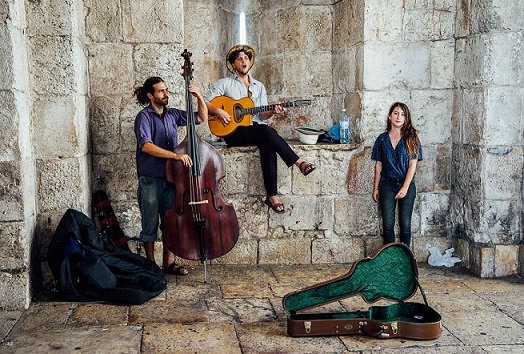
To help you create the best possible answers, I’ve included four things here:
- IELTS-style questions on the topic of music
- Sample answers
- A list of common music vocabulary with definitions & sample sentences
- Links to online reading and listening resources
You’ll find
PDF downloads of both the questions and sample answers and the vocabulary list
at the bottom of the respective sections.
The
questions relate to the Speaking test because this part of the exam offers the
broadest range of possible questions on this topic. They give the best
opportunity for me to demonstrate the vocabulary and for you to practise using
it.
I’ve
included IELTS-style questions and answers for all three parts of the Speaking
test. I’ve highlighted keywords and phrases in bold.
You’ll find
these words and phrases, and many others, in the vocabulary list beneath. There’s
also an audio to listen to the pronunciation.
Finally, at
the bottom of the page, I’ve added links to topical articles, short videos and
podcasts that will help you to improve both your music vocabulary and your
reading and listening skills.
IELTS-Style
Speaking Test Questions and Answers
Common music vocabulary
is highlighted in bold.
Part 1
1) What types of music do you like to listen to?
It depends on what mood I’m in but
generally, I like easy listening
although I am a massive fan
of country music and play
this genre more than any
other.
2) Are there any kinds of music that
you dislike?
I’m not really into jazz. It’s just not my taste in music, especially when
the musicians improvise. It sounds like they are
all playing different tunes
and there’s no harmony.
3) Do you ever go
to music gigs?
I love listening to live music and go to local gigs at least once a month. I only go
to concerts by top bands once in a blue moon as I live a long way from the big music venues.
4) Have you ever been in a music group or a band?
I
was a vocalist in my church
music group for several years
and also sang in the choir
when I was in school.
5) Does your country have a
traditional type of music or dance?
Folk music and Morris dancing are both traditional
in the UK. The music for this type of dancing is often played on the fiddle and accordion, with a drum
to give the dancers a good rhythm
and beat.
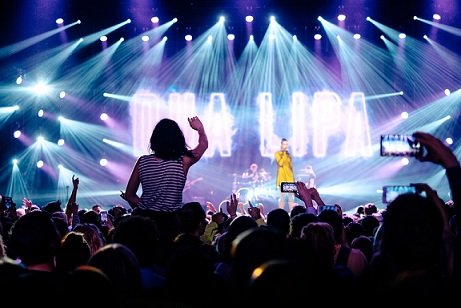
Part 2
Describe your favourite music
group or band.
You should say:
- what group or band is it
- what type of music they play
- how long you have been listening to their songs
and explain why you like this music
group or band.
I
like many different groups but
the one that comes top of my list has to be Bruce Springsteen and the E Street
Band.
I
first heard their music way back in 1980. I had a boyfriend who had one of their
albums and I was a fan from the first track I heard. I’ve been
listening to them ever since. The song
that really hooked me was “The River”. It’s still one of my favourite songs of all time. It has a slow,
haunting melody and beautiful
lyrics.
In
those days, very few people in my country had heard of Bruce Springsteen but
all these years later his band
are often on tour here and they
play sellout concerts around the world. His
nickname is “The Boss” which shows how much people respect him and his great
music.
Although
the E Street Band are essentially a rock
band, there are strong influences of folk, rock and roll, blues
and country in their music
which helps then appeal to a wide audience.
I
was once given two tickets to one of the band’s
concerts at Cardiff Arms Park
rugby stadium; a great venue. They were a Christmas present and I took my sister along with
me. It’s the only time I’ve seen them at a live
gig but it’s an event I shall never forget. What a wonderful experience.
We sang along to all the songs.
The
highlight of the show was when they performed “The River. At the end, the band stopped playing and Bruce
led the audience in singing the
chorus over and over again.
It was amazing and a very special moment. I actually found it quite moving as
that was the song that had
started me as a fan all those
years ago and there I was singing it with him. There was silence when it
finally ended and then the applause
started and went on for what seemed like forever.
It’s
hard to put in words why I like Bruce Springsteen and his band so much. I think it’s because their lyrics are so real while most of
the songs have a strong melody that stirs your soul. That’s
the best way I can put it.
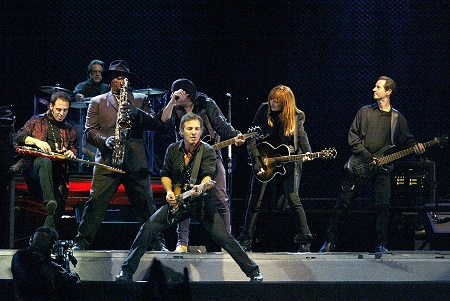
Part 3
1) Is it important to listen to
music with other people?
I think that listening to
music can be both a social experience and a personal one. Young people in
particular like chilling out
with friends while listening to their favourite tracks. There’s also something special about attending a live gig with your mates and singing along to the familiar tunes with all the other fans.
I’ve only ever been to a
couple of music festivals but
what I remember as much as the bands and
the fantastic music was the atmosphere of the events and that was created by all
the people who were there.
On the other hand, you can
enjoy music just as much when listening on your own. The fact that everywhere
you look there are people walking around wearing earphones or headphone
seems to be proof of this. So, in conclusion, I would say that while it’s nice
to share music with others, it’s not especially important.
2) Why
do you think older and younger generations prefer different types of music?
That’s
something I’ve never really thought about but I suppose it’s because they grew
up listening to different types of music as styles change over time.
Speaking
for myself, there are many talented new bands
and singers that I enjoy listening to. I often buy their albums and download
them onto my MP3 player, but
there’s nothing quite like the music I loved when I was in my teens. Perhaps it’s
as much to do with the memories it brings back as the music itself.
That’s
how I see it and I guess that many other people probably feel the same.
3) Do you think that music should
be a compulsory subject in schools?
I
do believe that music should be taught in schools. This is for several reasons.
Firstly,
it’s important to develop children’s creativity and music is a great way to do
this. They should be encouraged to learn to play a musical instrument, but it’s valuable if they just enjoy learning
and singing a few songs
together.
Secondly,
making music is an excellent way of teaching youngster how to work together in
a fun way and most of them enjoy performing to their friends.
Finally,
most schools put on concerts
and other musical performances. Taking part in these gives children confidence and
they are an important part of the curriculum.
While
older children may drop the subject for exams, having school choirs and orchestras provides
other opportunities for them to continue their interest in music.
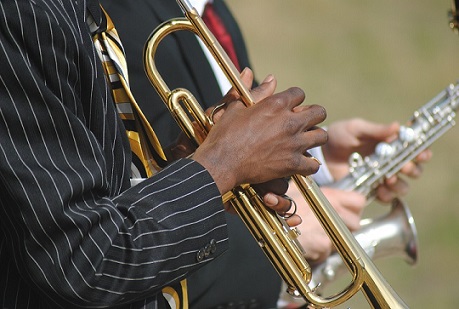
Click this link to get a PDF download of these practise questions & sample answers.
Download PDF Now
Music Vocabulary
* Important
- Do not try
and learn this list of music vocabulary.
- Identify
the vocabulary you find useful for answering practise questions about this topic.
- Record
these in your vocabulary notebook and practise using them regularly.
I recommend that you create
your own answers to the Speaking questions on this page. You will find many
other IELTS-style practise questions by searching online.
For help on how to learn
vocabulary, what to learn and how to record it, visit these pages:
How to Learn Vocabulary for
IELTS
Top 6 Types of IELTS
Vocabulary & Topic Word Lists
Music Vocabulary – Common Words & Phrases
Music Vocabulary Set 1: Key definitions
Set 1: Music genres
There are
many different styles of music around the world. These are some of the
mainstream genres but do add others to your own music vocabulary list if there
are particular styles you like that aren’t included here.
music genre – a distinct type or style of music
— My favourite music genre is rap.
pop – popular music; music liked by a
broad range of the population
— Pop songs are enjoyed by lots of different types of people
because they have a good rhythm, a catchy melody, and are easy to remember and
sing along to.
rock music
– music that is based on amplified instruments, especially the electric guitar
and electric bass, and characterized by a strong bass line and strong rhythms
— The Rolling Stones play some of the
best rock music ever written.
heavy metal – a type of highly amplified
harsh-sounding rock music with a strong beat, characteristically using violent
or fantasy imagery
— I like some rock music but find heavy metal a bit too loud.
rap – a
type of music in which the words are not sung
but are spoken in a rapid, rhythmic way
— Whilst I’m not a great fan of rap music, I do think it’s amazing how they speak so fast and
remember the words.
country music – a
form of popular music originating in the rural southern US. It is a mixture of
ballads and dance tunes played characteristically on fiddle, banjo, guitar, and
pedal steel guitar.
—
There’s a great country music venue
in my town where everyone dresses up as cowboys when they go to gigs.
jazz – a style of music that is generally
loud and rhythmic, where the musicians often make the music up as they go along
—
Louis Armstrong is still a popular jazz
musician many decades after his death.
reggae – a form
of music with a distinct beat that originated in Jamaica and is still
associated with the Caribbean
— Bob Marley was the first internationally known reggae musician.
blues – African-American
music that expresses grief or sorrow about injustice and a longing for a better
life
— Did you know that the blues
is named after the expression ‘to feel blue’ which means to be sad or
depressed?
Music Vocabulary Pronunciation
traditional music – songs and tunes particular to a country or region which have been performed over a long period of time, usually several generations
— Traditional music is part of our culture and should be preserved.
folk – traditional music which included
songs written a long time ago and new songs written in the old style
—
We have some talented young folk
musicians in my country who love performing songs from the old days and writing
new folk songs for our generation.
classical music – a form of music developed in Europe mainly in the 18th and 19th centuries by musicians highly skilled in musical composition
— I find that classical music
really stirs up the emotions and I particularly enjoy listening to Beethoven and Bach.
opera – a
musical play, often very dramatic, in which most of the words are sung
— I’m not a fan of opera
as I really don’t like the style of singing.
musical – a play or film that
uses singing and dancing in
the story but also includes a lot of spoken dialogue
— Although there are lots of great new musicals being written, I still love West Side Story the best.
instrumental music – music where you
just hear instruments playing and there is no singing
— I’m not happy when they play instrumental music on my favourite
radio station as I like to be able to sing along the lyrics.
easy listening
– a type
of music that is not complicated, is pleasant to listen and doesn’t need much
of your attention
— When I
get home in the evening I put on some easy
listening to help me relax after a busy day.
background music – music that is playing while something else is happening
— My friend likes to have background music on while she’s
studying but I need a quiet place to work.
Music Vocabulary Pronunciation
Music Vocabulary Set 2: Musical instruments & playing music
If there are any traditional musical
instruments popular in your country that you might want to talk about, add them
to your own music vocabulary list.
instrument – something you play to make music
Some common instruments:
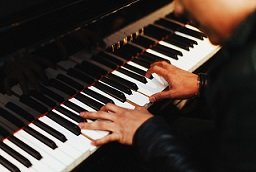
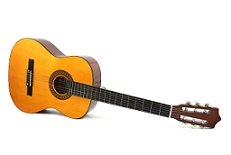
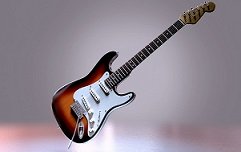
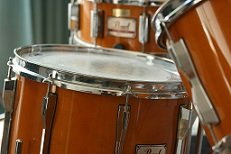
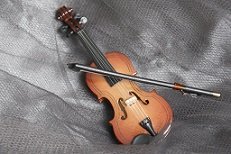
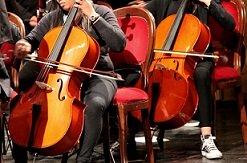
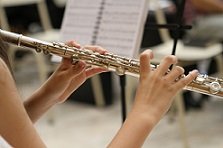
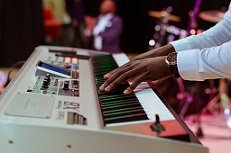
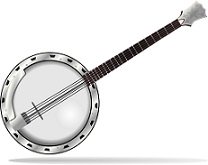
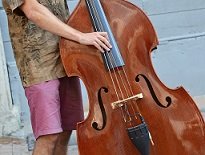
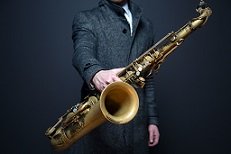
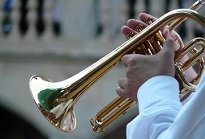
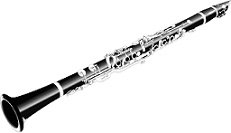
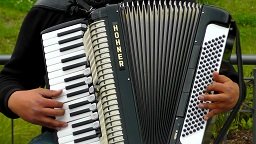
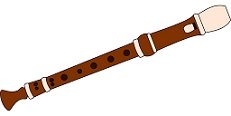
Music Vocabulary Pronunciation
traditional
instruments – a type of instrument that
has been played for many generations or that was popular in the past,
often unique to a country or region
— A sitar is a
traditional Indian musical instrument.
to take up (a musical
instrument) – to
begin learning a musical instrument
— I’m going to take up the guitar.
to read music – to understand and follow written
musical notes
— I’m so glad I learnt to read music when I had piano lessons as
a child because it really helps me now that I sing in a choir.
to play by ear – to play without reading the
musical notes
— Many talented musicians can’t even
read music and only play by ear.
talented
– to be naturally skilled at something
—
I never got the hang of playing an instrument even though both my
parents are talented musicians.
to
be musical – have a
skill in or a great liking for music
— My friend Sally is very musical and can play several different
instruments.
self-discipline – the ability to make yourself do things you know you
should do even when you do not want to
— You need
a lot of self-discipline to learn
the piano as you have to practise every day and play boring scales.
sense
of accomplishment – to feel
like you’ve achieved something you can be proud of
— Bernie
felt a real sense of accomplishment
at passing his Grade 2 flute exam.
vocals – a part of a piece of music that is sung
— My parents met in a band. Dad was a guitarist and Mum sang vocals.
Music Vocabulary Pronunciation
Music Vocabulary Set 3: Musicians
musician – a person who plays a musical instrument, especially as a
profession, or is musically talented
— It was Jai’s ambition to be a professional musician and play in a famous
orchestra.
bass player
– someone who plays the bass
conductor
– the person who leads the orchestra
guitarist
– someone who plays the guitar
keyboard player
– someone who plays the keyboard
pianist
– someone who plays the piano
drummer
– someone who plays the drums
cellist
– someone who plays the cello
violinist
– someone who plays the violin
vocalist
– someone who sings
— Phil Collins was unusual in being both the drummer and lead vocalist in a band, the famous Genesis.
choir
– a group of singers singing together
— Lulu really enjoyed singing in the choir, especially when they performed at concerts.
orchestra – a large group of musicians who play many
different instruments together and are led by a conductor
— Jason was delighted when he was asked to play violin in
the school orchestra.
band – a group of people who
sing together and also play instruments
— I was so excited to be asked to play
bass guitar in the new band.
group – a collection of people
who sing together but do not necessarily play instruments
— All the groups performing
in the contest were excellent and it was hard for the judges to pick the best.
composer
– a
person who writes music, especially as a professional occupation
— My favourite classical composer is Mozart.
Music Vocabulary Pronunciation
Music Vocabulary Set 4: Live music
a performance
– the act of entertaining other people by dancing, singing, acting or
playing music
—
The choir gave a wonderful performance at my sister’s wedding.
a gig
– a performance of a band
— My new band is playing their first gig at the weekend.
a show
– a performance,
especially involving music
— I’m
going to my kid’s school this evening to watch them perform in a show.
live
music – music
performed in front of an audience
— We have many clubs in my city and
I often go along with friends to listen to live
music.
Collocations:
- live show
- live
performance - live gig
music festival – an organized event, typically lasting several days, featuring
performances by various musicians, singers and groups
— I try to go to at least one music festival each summer.
concert – a performance of music by one or more
musicians or singers
— My orchestra is going to perform at a concert organized to raise money for charity.
stage
– a raised platform on which musicians, actors or entertainers
perform
— I felt nervous when I walked out on stage and saw the large audience waiting to hear me sing.
venue – the place
where a public event such as a concert happens
— The disused warehouse was
the perfect venue for a rock
concert.
Music Vocabulary Pronunciation
Music Vocabulary Set 5: Recorded music
recording / recorded music – music that has been
stored on a record, CD, computer, etc., so that it can be heard again
— I
have recordings of many of my
favourite bands stored on my computer.
MP3
player – an electronic device that can store and play digital audio files
— I always carry my MP3 player with me so that I can listen
to music whenever I want to.
headphones
/ earphones – an electronic device that fits over or in the ears for
listening to music
— I wear earphones
to listen to music on my MP3 player while I’m out jogging.
album – a collection of recordings issued as a single item on
CD, record or another medium.
— I can’t
wait for my favourite band’s new album
to come out.
to download tracks – to obtain music from the internet
— I heard a great band at the gig
last night and I’m going to download
some of their tracks.
speakers
– a piece of electrical equipment for playing recorded sound, through which the sound is played
— The jazz album I got for my
birthday sounds amazing
through my new speakers.
Music Vocabulary Pronunciation
Music Vocabulary Set 6: Describing music &
songs
a song
– a
usually short piece of music with words that are sung
— My favourite Ed
Sheeran song is “Thinking Out Loud”.
lyrics – the
words to a song
— Leonard Cohen wrote some
of the best lyrics of all time and
many artists still perform his songs today.
a melody – the main tune in a piece of music that is often played or sung more than once
— I had
trouble picking up the melody of the
new piece we started learning at choir rehearsal today and will practise it at home.
a tune
– the musical part of a song, especially one that
is pleasant and easy to remember
a catchy tune – a tune or a song that’s easy to
remember and stays in your mind so that you find yourself humming or singing it
— I heard a really catchy
tune of on my kid’s TV programme this morning and I’ve been humming it all
day.
piece of music – a musical composition, especially but not necessarily an
instrumental one
— My piano teacher has given me a
new piece of music to learn before
my next lesson.
taste in music – the music someone likes
— My boyfriend and I have the same taste in music and go to live gigs
whenever we can.
rhythm
– a regular, repeated pattern of sounds
— I love the rhythm of
reggae music.
beat
– a characteristic
rhythm in some types of music
— Rap music has such a distinctive beat.
harmony – a pleasant musical sound made by different notes being
played or sung at the same time
— One of
the reason I enjoy country music so much is because many songs have lovely harmonies.
Music Vocabulary Pronunciation
to be out of tune – to play or sing slightly wrong notes
— My dad likes to sing along the radio but is so out of tune that it sounds terrible.
to be in tune – to play or sing with the correct pitch
— Before the performance, the guitarist tightenend the strings of his guitar so that it was in tune.
to have a great voice – to sing well
— I think my friend should enter the singing competition as she has a great voice.
to be tone deaf – to be unable to distinguish the different notes in music
— I’d really like to able to sing but I’m tone deaf so I don’t think there’s much chance.
chorus – a regularly repeated line or group of lines in a song
— The choir sang lots of well-known songs and encourages the audience to sing along to the choruses.
upbeat – cheerful or lively
— If I’m feeling sad I put on some upbeat music and feel better almost at once.
nursery rhyme – a simple traditional song or poem for children
— I can still remember many of the nursery rhymes I learnt as a child.
lullaby – a quiet, gentle song sung to send a child to sleep
— If my baby wakes up in the night I just sing him a lullaby and he soon goes back to sleep.
sing to sleep – to make someone feel sleepy by sing them a gentle song
— My mum used to sing us to sleep when we were young.
Music Vocabulary Pronunciation
Music Vocabulary Set 7: Music & the emotions
passionate –
to feel strongly about something
— I’m passionate about playing the saxophone.
to cheer
up – to cause to feel better
— Upbeat music always cheers me up if I’m feeling down.
relax / chill
out – to become less tense or
anxious
— After a stressful day at
work, I lie in the bath listening to classical music as this helps me to chill out.
energise
– to
make someone feel energetic or eager
— Reggae music energises me so that’s what I Iisten to
when I feel sluggish and need motivating.
Music Vocabulary Pronunciation
Music Vocabulary Set 8: Other music vocabulary
rock band – a group of musicians that play rock
music
— One of the great things about
living in Manchester is that all the top rock
bands perform here.
pop star – a famous singer or musician who performs
pop music
— Many teenagers have the dream of
being a pop star as they want to be rich and famous.
famous – known about and recognized by
many people
— The Beatles are one of the most famous bands ever to have existed.
frontman –
lead singer of a band
— Roger Daltrey has been the frontman of The Who for over 50 years.
fan – a person who admires, supports or follows a person, band or team
— I’ve always been an Elvis Presley fan even though he died before I was born.
huge
following – to have a large number of fans
— Modern pop stars have a huge following
which they communicate with on social media.
to go on tour – to go on a planned series of performances around a region
or country
— I hope my favourite band go on tour again soon as they put on an
amazing live show.
sellout – a performance or sports event for which
no more tickets are available because it’s so popular
— The Bruno Mars concerts were a sellout at every venue on the tour.
record company
– a business that makes and sells musical recordings
— Our band
is getting well-known across the country and we’re hopeful of getting signed by
a record company.
record label
– a brand or trademark associated with the marketing of music recordings and
music videos
— You know you’ve hit the big time if you get signed up with
one of the big record labels such as
Sony.
hit the big time
– to become successful and/or famous
— After winning the TV talent show, Shelley hit the big time and was soon singing
in huge venues around the world.
a hit – to be popular; a record that sells lots of copies
— “Happy” was a massive hit for Pharrell Williams.
Music Vocabulary Pronunciation
the charts – a list of individual songs or musical performances ranked in order of number of sales or downloads over a specific period of time which indicates their popularity
— Ariana Grande’s new record is brilliant and I’m not surprised it’s made it to No.1 in the charts.
to sing along to – to join in singing
— My favourite songs in the charts are always the ones you can sing along to.
a sing-song – to sing informally, often with other people
— I have wonderful memories of my gran playing popular songs on the piano at family get-togethers and everyone joining in for a sing-song.
music-lover – someone who really enjoys listening to music
— I can’t say I’m a great music-lover although I do enjoy listening to the radio when I’m driving.
applause – approval or praise expressed by clapping the hands together
— The applause continued even after the band had left the stage.
- a round of applause – an outburst of clapping from an audience to show approval
— The audience gave the choir an enthusiastic round of applause as they came on to perform.
to be into / not into – to be interested in or involved with / to not be interested in
— I’m really into folk music but not into jazz at all.
to improvise – create and perform music, drama or verse spontaneously or without preparation
— I don’t enjoy listening to jazz when it’s improvised as it sounds like the musicians are all playing different tunes.
once in a blue moon – hardly ever
— I’m definitely a music-lover but only go to live gigs once in a blue moon.
Music Vocabulary Pronunciation
Click this link to get a PDF download of this list of music vocabulary.
Download PDF Now
Ways to Improve Your Music Vocabulary
One of the best
ways to improve your music vocabulary is through reading. Watching topic related YouTube
videos and listening to podcasts is also hugely beneficial.
Here are some
online resources I recommend.
Music Articles
These online publications contain music news and related articles. Most music genres have their own publications so search for those that particularly interest you, e.g. «Jazz magazines» or «Jazz articles».
Pitchfork
BBC News — Music
The Guardian — Music
TED Talks
I love TED Talks. They are short videos
with a powerful message and are generally very interesting. They’re ideal for
improving your vocabulary and give valuable listening skills practise.
Search TED Talks — Music to help you improve your music vocabulary. It will take a bit more searching to find something relevant than with some other topics but it’s worth seeing what you can find.
All Topic Vocabulary
Like this page?
-
Home
-
IELTS Vocabulary
-
Music Vocabulary
›
›
-
Back To Top
Англо-русский глоссарий по теме «Музыка» (Music) с транскрипцией
| English term | Транскрипция | Русское название |
| accompany | [ tuː əˈkʌmpəni ] | аккомпанировать |
| accordion | [ əˈkɔːdjən ] | аккордеон |
| album | [ ˈælbəm ] | альбом |
| bagpipe | [ ˈbægpaɪp ] | волынка |
| balalaika | [ ˌbæləˈlaɪkə ] | балалайка |
| ballet | [ ˈbæleɪ ] | балет |
| band | [ bænd ] | группа |
| bass | [ beɪs ] | контрабас |
| bassoon | [ bə’suːn ] | фагот |
| baton | [ ˈbætən ] | дирижерская палочка |
| bow | [ baʊ ] | смычок |
| brass instruments | [ brɑːs ‘ɪnstrəmənts ] | медные духовые инструменты |
| cello | [ ˈʧɛləʊ ] | виолончель |
| chamber music | [ ˈʧeɪmbə ˈmjuːzɪk ] | камерная музыка |
| clarinet | [ ˌklærɪˈnɛt ] | кларнет |
| classical music | [ ˈklæsɪkəl ˈmjuːzɪk ] | классическая музыка |
| compose | [ tuː kəmˈpəʊz ] | писать музыку |
| composer | [ kəmˈpəʊzə ] | композитор |
| concert | [ ˈkɒnsət ] | концерт |
| conductor | [ kənˈdʌktə ] | дирижер |
| cymbals | [ ˈsɪmbəlz ] | тарелки |
| drum | [ drʌm ] | барабан |
| drum sticks | [ drʌm stɪks ] | барабанные палочки |
| flute | [ fluːt ] | флейта |
| grand piano | [ grænd pɪˈænəʊ ] | рояль |
| guitar | [ gɪˈtɑː ] | гитара |
| harp | [ hɑːp ] | арфа |
| horn | [ hɔːn ] | рожок |
| instrumental music | [ ˌɪnstrʊˈmɛntl ˈmjuːzɪk ] | инструментальная музыка |
| loudspeaker | [ laʊdˈspiːkə ] | динамик, громкоговоритель |
| microphone | [ ˈmaɪkrəfəʊn ] | микрофон |
| musical instruments | [ ‘mjuːzɪkl ‘ɪnstrəmənts ] | музыкальные инструменты |
| musician | [ mjuːˈzɪʃən ] | музыкант |
| oboe | [ ˈəʊbəʊ ] | гобой |
| opera | [ ˈɒpərə ] | опера |
| operetta | [ ˌɒpəˈrɛtə ] | оперетта |
| orchestra | [ ˈɔːkɪstrə ] | оркестр |
| organ | [ ˈɔːgən ] | орган |
| percussion | [ pəˈkʌʃən ] | перкуссия, ударные инструменты |
| piano | [ pɪˈænəʊ ] | пианино |
| recital | [ rɪˈsaɪtl ] | сольный концерт |
| saxophone | [ ˈsæksəfəʊn ] | саксофон |
| single | [ ˈsɪŋgl ] | сингл – песня, выпущенная и продаваемая без альбома |
| soloist | [ ˈsəʊləʊɪst ] | солист |
| song | [ sɒŋ ] | песня |
| sound | [ saʊnd ] | звук |
| string instruments | [ strɪŋ ‘ɪnstrəmənts ] | струнные инструменты |
| symphony | [ ˈsɪmfəni ] | симфония |
| synthesizer | [ ˈsɪnθɪˌsaɪzə ] | синтезатор |
| transcribe | [ tuː trænsˈkraɪb ] | записывать нотами |
| trombone | [ trɒmˈbəʊn ] | тромбон |
| trumpet | [ ˈtrʌmpɪt ] | труба |
| tuba | [ ˈtjuːbə ] | туба |
| video (clip) | [ ˈvɪdɪəʊ klɪp ] | видео-клип |
| viola | [ vɪˈəʊlə ] | альт |
| violin | [ ˌvaɪəˈlɪn ] | скрипка |
| virtuoso | [ ˌvɜːtjʊˈəʊzəʊ ] | виртуоз |
| wind instruments | [ wɪnd ‘ɪnstrəmənts ] | духовые инструменты |
Strike A Cord: Music Vocabulary For Creative People
13 min
Created: February 2nd, 2023Last updated: April 12th, 2023
Contents
Music is one of those topics that are great for small talk. If you don’t really know a person you are interacting with, asking about their music preferences won’t do much harm. There are no indifferent people when talking about music. Everybody has a favorite song, genre, singer, band, and instrument. So, no wonder a music conversation often leads to a big discussion that will help you get to know the person much better. However, to cover this topic in English, you will need to add some musical terms to your vocabulary.
Do you know enough music words in English? Let’s check it right here and right now. We guarantee that the music vocabulary carefully compiled by Promova will expand your horizons in English proficiency.
Music Terms: Idioms For Everyday Use
Music has always been an excellent source of inspiration, motivation, and useful vocabulary for English learners. So, it’s not a big surprise that some English idioms originated from music-related words. Some phrases with music terms grew away from their original meanings and turned into fixed figurative parts of speech that always pop up in your head as a nasty catchy song. Since it’s difficult to overestimate the importance of idioms in English, we suggest you learn some related to music. Here are the best 15 music idioms worth adding to your vocabulary.
- Hit the right note/ strike the right note
Meaning: to do or say something perfectly suitable or absolutely right in a particular situation or circumstances.
Example: You just hit the right note by ordering this chocolate mousse. - Blow your own trumpet/ blow your own horn / toot your own horn
Meaning: to brag about your achievements, to talk excessively about your talents and abilities in a way that shows your pride.
Example: As a managing partner of this law firm, I want to see you winning this case, not just blowing your own horn! - Like a broken record
Meaning: To talk about something or someone over and over again, to tell the same story on repeat.
Example: Okay, we got it – you’ve been to France recently. Stop saying «merci» like a broken record! - And all that jazz
Meaning: and other similar/related things; etc.
Example: My love for lipsticks, blushes, eye shadows, and all that jazz is enormous. - Music to my ears/music to my eyes
Meaning: to hear or to see (depending on the version) something pleasant that brings joy and happiness.
Example: A couple of Bradley Copper and Lady gaga in the movie A Star Is Born is true music to my eyes. - Swan song
Meaning: a final act, gesture, or saying before ending something or disappearing
Example: I thought it would be a peaceful breakup, but after her swan song, I understood that I couldn’t be more wrong. - Ring a bell
Meaning: to sound familiar, to remind something but with no specific details.
Example: The movie Midnight In Paris rings a bell for me, but I can’t really remember the whole plot. - Change your tune / sing a different tune/ sing a different song
Meaning: to change your opinion on something, to shift your mind to other ideas than you had before.
Example: After this adventurous trip to Asia, I have definitely changed my tune about Asian cuisine. - Face the music
Meaning: to accept or deal with criticism or consequences of your actions or bad decisions.
Example: Principal, I understand cheating during the final exam is unacceptable, so I am ready to face the music. - Play second a fiddle / Be second a fiddle
Meaning: to be in a position where you are treated as a less important person compared to someone you are working with.
Example: I can’t believe she did something like that. I thought we were partners, but I was just second fiddle to her. - Fiddle while Rome burns
Meaning: to procrastinate or do something unimportant when are much more vital things to deal with.
Example: People say that the 2023 tech layoff was necessary. But as an expert, I can say they fiddled while Rome burned. - Jazz up
Meaning: to improve something by making it more attractive and exciting, to add liveliness to something.
Example: This OOTD would be a no go if we didn’t jazz it up with the leather belt and purse. - Play by ear
Meaning: to improvise, to act in a moment according to what is happening, and to handle the situation as it comes.
Example: Sometimes, the best date happens when you don’t follow a plan and just play it by ear. - Make a song and a dance about something
Meaning: to make an unnecessary fuss because of something and act like something is more important than it really is.
Example: OMG, you just broke your nail, it’s not like you broke your arm. Stop making a song and dance about it. - Elevator music
Meaning: monotonous and boring music played in public places.
Example: Every song in the album can’t be a hit, some of them are meant to be elevator music.
Music Words: The Most Popular Genres And Instruments
When it comes to music in English, people usually would love to have a music terms list that would help them keep up with everyday conversations. For instance, you’ve heard this trendy song on TikTok, and now it is stuck in your head. So naturally, you want to describe it to your friend. To do that, you need to know the singer, the music genre, and the instruments that make the song so catchy or touching. That is why you need to learn musical terms for the most popular genres and instruments in English.
There are many different music genres in the modern music industry. People can choose whatever style they prefer. Finding your cup of tea on Apple Music or Spotify is not an issue nowadays. The diverse representation of all music genres does impress.
The most appealing music genres for the last several years are the following:
— Pop
— Hip hop
— Rock
— Reggae
— Country
— Soul
— Rhythm and blues
— Funk
— Folk
— K-Pop
— Funk
— Electronic
— Blues
— Jazz
— Disco
— Metal
— R&B
Now let’s move on to the musical instruments. Depending on how the instrument creates the sounds, it can belong to a particular category. According to the Hornbostel-Sachs instrument classification system, all musical instruments can be divided into:
— Idiophones, where the sound is created by the body of the instrument vibrating;
— Membranophones, which make the sound with the vibration of a tightly stretched membrane;
— Chordophones in which in charge of the sound are stretched between fixed points strings;
— Aerophones which produce sounds by vibrating air;
— Electrophones where the sound is made by electric action or amplification.
There is an excellent variety of musical instruments in the world. People managed to learn how to play all of them and make great melodies and songs using them. Of course, if you are not a total beginner in English (which we doubt because you can read this article), you know basic music vocabulary such as piano, guitar, violin, drums, cello, etc. Nonetheless, there are many more musical instruments that you can hear in the biggest hits of all time and some typical ones that are primarily played in a particular country or region. So, let’s learn some music vocabulary — words that name musical instruments.
Accordion
This musical instrument, as it looks today, comes from Italy. It was Paolo Soprani who invented the «modern» accordion. According to Oxford Dictionary, an accordion is played by stretching and squeezing with the hands to work a central bellow that blows air over metal reeds, the melody, and chords being sounded by buttons or keys.
Bagpipe
The following musical instrument got its name because of the way it was constructed and how it looks like. The bagpipe is literally a bag with reed pipes that make sounds because of squeezing the bag full of air with the musician’s arms. This musical instrument is traditional in Scotland, Ireland, and some parts of England. Remember how Ross from Friends discovered that Chandler is half-Scottish, so he decided to play the bagpipe at his and Monica’s wedding? Yeah, it was a disaster. But in reality, the sound produced by bagpipes is pretty enjoyable.
Banjo
Banjo is a part of one of the stereotypes about Americans called rednecks. People apply the term «redneck» to white Americans who are uneducated, primitive, and dumb and come from villages in the South of the United States. They are usually portrayed wearing jeans jumpsuits, with the straw hat on their head and a banjo in their hands. Banjo reminds a classical guitar but comes with a round open-backed soundbox of parchment stretched over a metal hoop.
Castanets
If you have ever seen a live or recorded flamenco performance, you must have noticed that dancers hold some kind of musical instrument in their hands. It is called castanets. Castanets is a musical instrument that looks like two concave pieces of wood or plastic joined together with a string. When a musician puts castanets together with the fingers, it creates a clicking sound. Usually, with castanets, dancers follow the main melody of the performance.
Cymbal
The cymbal is one of those musical instruments you could’ve seen in American movies about a high school where kids participate in parades. There is always one school orchestra member who plays cymbals. It looks like perfectly-shaped thin metal discs that make a crash or clang sound once smashed together.
Harmonica
That’s not Monica from Friends. And yes, we are mind readers. In fact, the harmonica is a small mouth organ that looks like a rectangular case containing a set of metal reeds connected to a row of holes inside. When musicians play harmonica, they blow and suck air into the musical instrument and move it side to side.
Maracas
Maracas is one of the typical musical instruments for Latin America. Probably, you’ve seen girls using it during the Brazilian carnival. Maracas go in pairs and look like bulbs with handles. They are made from hollowed gourds with stones, beans, or seeds inside. Shaken quickly, they cause vibrating like a rattle.
Organ
An organ is a musical instrument that looks like a giant piano. The main difference is that it has one or more pipe divisions that produce tones. These days, you can bump into organs only in churches and cathedrals. Musicians play organs during religious services.
Tambourine
If you are European, remember the outstanding performance of the Ukrainian singer Ruslana at the Eurovision Song Contest in 2004. Back then, the artist made everyone fall for her energetic performance and the winning song Wild Dances, where they used tambourines as one of the leading musical instruments. Tambourine is a wood or plastic frame with pairs of small metal jingles. It produces sounds when the musician shakes or strikes it with a hand or hits some part of the body with it.
Ukulele
A ukulele is a small guitar with four nylon strings. Even though people got used to thinking about the ukulele as a part of Hawaiian culture, it has Portuguese origins. At the end of the 19th century, immigrants from Portuguese islands brought the musical instrument to the Hawaiian Islands and introduced it to locals. There are four sizes of ukulele: soprano, concert, tenor, and baritone.
5
Essential Music Terminology To Keep In Mind
For ordinary people, the musical vocabulary of a professional musician may seem bottomless. But the truth is that non-professionals in the music industry don’t really know all the nuances and every musical term to speak more or less fluently. As an English learner, you need to have a common sense of the musical terminology you might hear in real-life communication. To your attention, we propose some music terms that you definitely need to remember.
Baton
That’s the main work instrument for the orchestra or choir conductor. Baton is a short stick for directing a group of musicians.
Chorus
The chorus is a part of a song where lyrics repeat. That is what usually makes a song memorable and catchy. People may not remember the verse (the other part of the song), but it will be challenging to get rid of a catchy chorus.
Cover
By the cover in music, people understand a new recording of the previously released song made by a performer other than the initial artist. The new version of the song can consist of changes in melody, vocals, and even lyrics.
Libretto
The libretto is a script of songs for musical theater, usually opera.
Maestro
Maestro can become any great composer, conductor, or singer that left a mark in the music industry with their work.
Pitch
A pitch is a position of a single sound in a range of sounds that allows us to define it as high or low. You could’ve heard this musical term in the movie The Perfect Pitch, where collocation means someone’s ability to correctly identify and/or recreate a note upon hearing it. Actually, that is what the movie is really about.
How To Learn Music Vocabulary With Promova
Learning new vocabulary regularly and implementing it into use play a key role in achieving proficiency in English. To improve any English skill, you need to memorize new words and phrases, understand grammar, and practice as much as possible. The best way to learn words is to divide them into topics, create bite-sized lessons, take turns with the repetition method, and live practice enlarging your vocabulary on each subject.
The perfect assistant for memorizing new words in English is an innovative learning language platform Promova. With our app, you can learn new words, easy breathy lemon squeezy. To start, you just need to:
— take a quick test to determine your English proficiency level;
— decide whether you want to get a guided step-by-step experience according to your level or you are more interested in exploring our bite-sized lessons independently;
— choose a language in which you desire to learn English (we recommend learning English through English);
— pick one of our courses – General English, Travel English, Business English, or English with TV series and jump into learning.
As a one-stop language learning platform, Promova also offers other features — tutoring programs for all levels and needs, a free Conversation Club, social media, and a blog. So, if you want to read more on some specific topics like poetry in English or how to describe a painting, don’t be shy to scroll through our feed in the Promova blog more often.
If you are a musician, singer, or music enthusiast who wants to learn more musical terminology, you can always take individual English classes with the Promova certified tutors. Our teachers will prepare a personalized learning plan considering your current and desirable level, strengths and weaknesses, goals, interests, and preferable learning techniques. So, be sure that with Promova, the list of musical terms you need to know won’t be limited to «song» or even «melismas.»
We also suggest our students participate in the Promova Conversation Club. The meetings are free and held regularly every week. Our professional teachers work on speaking with English students in small groups. So, we always suggest checking the upcoming classes’ topics in advance and signing in several days prior. The Promova Conversation Club stays up-to-date with trends and requests from our students, so you can always find a fascinating topic to discuss, and music terminology is one of them.
Conclusion
Learning languages is a lifelong process, and exploring any topic in terms of new vocabulary is gripping. So, going back to what seemed to be an easy topic is the best idea ever. We bet that before reading this article on musical terminology, you thought you knew a lot of it. However, there always are areas for improvement. After reading this article, you can make your speech more vivid and memorable with music idioms, instruments, and genres and even understand some high-end convos where professionals use specialized music vocabulary.
FAQ
Why is music called music?
On its own, the word «music» is a simple term that English learners memorize at the beginning of their learning journey. However, it has a pretty interesting history. «Music» has Greek origins and comes from the word «mousikê,» which means «art of the Muses.» In Ancient Greek Mythology, Muses were in charge of the arts and sciences. Back then, the term wasn’t exclusively used for the pleasant combination of sounds. Only in the fifth century did Italian philosopher Boethius split the music into three major kinds, where only «musica instrumentalis» referred to music as performed sound. The term «music,» as we define it today, came into use in the 1630s. But French-American composer Edgard Varèse described it as «organized sound» only in the 20th century.
What are the 10 elements of music?
To call any piece of gathered sounds music, it must contain several elements of music. The elements of music are the specific features that make it legit to define something as music. There are 10 elements of music – rhythm, harmony, melody, timbre, pitch, beat, tempo, texture, dynamics, and structure.
How many music notes exist?
By note in music, people understand a specific audio vibration produced by any musical instrument or person’s voice. For example, in Western music, there are 12 music notes: C, C# / Db, D, D# / Eb, E, F, F# / Gb, G, G# / Ab, A, A# / Bb, B. Simply put, notes in music are like letters in the alphabet. Musicians need them to create, read and reproduce sounds that become music pieces. Professional playing musical instruments, composing music, and singing are impossible without theoretical knowledge of notes. Any musical education starts with learning music notes and how to handle them. Only then can a person move on to practice playing chosen instrument and songwriting.
Why do many music terms have Italian origins?
As surprising as it might be for those who never studied in music school, most musical terms come from Italy. There is a pretty rational explanation for such a phenomenon. Italy is a land of many talented musicians. So, no wonder that it is the country where music notation was established in the first place. Not only did Italian composers add annotations to their scores, but they also came up with the essential music vocabulary that describes how it should be played. In the Renaissance epoch, musicians from all over the world came to Italy to practice music, so naturally, they were using Italian music terms. Then, in the 1800s, people started annotating scores in their native languages, mixing them with Italian words. That is why some music terms may sound more Italian than English in the English language.


